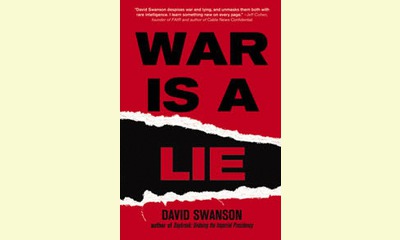|
|
Connecticut Advances Conversion from War to Peace Economy
un articulo por David Swanson, OpEdNews (abridged)
The Connecticut legislature has sent to the
governor to sign a bill that would create a
commission to develop a plan for, among other
things:
"the diversification or conversion of defense-
related industries with an emphasis on encouraging
environmentally-sustainable and civilian product
manufacturing. On or before December 1, 2014, the
commission shall submit such report to the
Governor and, in accordance with the provisions of
section 11-4a, to the joint standing committee of
the General Assembly having cognizance of matters
relating to commerce."

War Is a Lie, by David Swanson
click on photo to enlarge
The commission "shall Advise the General Assembly
and the Department of Economic and Community
Development on issues relating to the
diversification or conversion of defense-related
industries" among other things.
Read the full text.
According to Peace Action,
sponsor State Senator Toni N. Harp from New Haven
has said,
"The proposed Futures Commission will set up a
framework that allows us to convert many of our
military related jobs and infrastructure into non-
military industries."
This is a remarkable breakthrough that didn't just
come out of nowhere:
"In November 2012, a ballot referendum passed in
New Haven that called for moving the money from
war to jobs rebuilding our infrastructure and
human needs. This referendum won support nearly 6
to 1! This winter in Connecticut, the US Peace
Council, No Nukes No War, the City of New Haven
Peace Commission with the support of the state
AFL-CIO and International Association of
Machinists worked to get SB619 introduced in the
state legislature calling for a Futures Commission
whose goals is to investigate how to convert the
weapons manufacturing industries to producing
civilian, green products and retain and develop
manufacturing in the state. The Commission that
this bill creates will include representatives of
labor, peace and environmental organizations."
In February, Bill Shortell, an official with the
International Association of Machinists in
Connecticut, explained
what's needed this way:
"Diverse forces are now converging in an attempt
to carve up the military budget. These are (1) those who would cut it
to reduce the deficit. There is considerable
logic on their side. The solvency of the nation,
in many people's eyes, is threatened by the size
of the debt compared with our GDP. About 30% of
our government runs on borrowed cash. The same
proportion can be applied to the military budget.
"Then there is growing group (2) that wants to "Move
the Money" to much-needed social services,
like health and education, and also to repair our
crumbling infrastructure.
"There is also a powerful group (3) who would not
reduce the military budget at all. This group
somehow imagines the continued military usefulness
of fighter jets, nuclear subs, etc, even though
they rarely argue this. They instead generally
justify continued military spending because of the
millions of jobs and billions in profits that it
creates.
"Finally, there is a small group (4), which sees
the dismantling of the military budget as
inevitable, and is making plans for alternative
uses of the "procurement" part of the budget. This
is about $100 billion of the $700 billion budget.
We advocate re-assigning workers and switching
capital to products, which have a peacetime use. .
.
|








|
DISCUSSION
Pregunta(s) relacionada(s) al artículo :
The peace movement in the United States, What are its strengths and weaknesses?
* * * * *
Comentario más reciente:
CPNN has received the following story illustrating strengths of the US Peace Movement as it attempts to block an American war with Iran:
********************************
Anti-War Movement Successfully Pushes Back Against Military Confrontation With Iran
By Mark Weisbrot, AlterNet
Who says there's no anti-war movement in the United States? In the past two months, the anti-war movement has taken on one of the most powerful lobbying groups in the United States in an important fight. And so far, the anti-war movement is winning.
Here's the story: On May 22, a bill was introduced into Congress that effectively called for a blockade of Iran, H. Con. Res. 362. Among other expressions of hostility, the bill calls for: "prohibiting the export to Iran of all refined petroleum products; imposing stringent inspection requirements on all persons, vehicles, ships, planes, trains, and cargo entering or departing Iran ... " This sounded an awful lot like it was calling for a blockade, which is an act of war. A dangerous proposition, especially given all the efforts that the Bush-Cheney administration has taken to move us closer to a military confrontation with Iran, the bluster and the threats, and the refusal to engage in direct talks with the Iranian government. . ... continuación.

|
|









